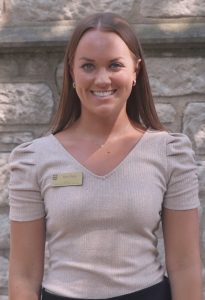The accelerated master’s coordinated program in dietetics within the nutrition and exercise physiology (NEP) degree program offers students a unique opportunity to earn two degrees in just five years.
The program prepares students to become registered dietitian nutritionists (RDN).
Students who complete the program come away with a bachelor’s degree in nutrition and exercise physiology, with an emphasis in nutrition and foods; a master’s degree in dietetics; and all of the internship hours necessary to take the registration examination for dietitians (RD Exam).
It’s a program that Samantha Tracy, a master’s student in dietetics, said she is thrilled to have found.
“I’m so glad that I chose this major,” Tracy said. “I’ve had invaluable experiences that will set me up for success in my future career. I feel really prepared for the workforce, and I’m very thankful for that.”

Students in the program take three years of prerequisites and spend two years in the coordinated program in dietetics. The maximum number of students admitted to the coordinated program is 20 per year.
Tracy said the hands-on learning opportunities offered through the program have been incredibly important during her time at the University of Missouri. She said that those opportunities, combined with professors who take the time to invest in their students, has lead to a great learning environment.
“I’ve gained so many opportunities in a variety of settings, and I’ve really been able to get to know my professors within the program really well,” Tracy said. “Building those relationships has been very important. Since our professors know us so well, they place us with preceptors who they know you would work well with. It helps provide the best learning experiences for each student.”
Tracy grew up in Quincy, Ill., in a family that was very health-conscious. When she chose MU, she wanted to find a program that focused on nutrition – as well as would allow her to pursue her interests in science, food and helping others.
Tracy said the accelerated program focuses on three main areas – food service, community and clinical, with an emphasis on medical nutrition therapy. Students within the program get hands-on experiences in each area. As someone who enjoys teaching, Tracy said being able to share nutrition information with a variety of audiences has been rewarding.
“While in the program, we’re required to teach a wide variety of populations on different nutritional topics,” Tracy said. “One of my biggest passions for nutrition centers on the preventive side of it. The ability to help people and make a difference in their long-term health is really important to me, and I’m grateful that I’ve been able to have a lot of those conversations with patients/clients already.”
For her food service rotation, Tracy has worked with MU campus dining services. She worked at Plaza 900 Dining assuming roles of a general dining hall worker, where she helped with multiple tasks, including cooking and serving food. This spring, Tracy said she will complete her food service hours at Plaza 900, taking on bigger roles such as developing recipes and shadowing the managers.
As far as community work, Tracy has worked with the Women, Infants and Children (WIC) nutrition program; the Boone bariatric clinic; and the Mizzou Athletics Training Complex (MATC). Prior to her admittance to the program, she volunteered with Pascale’s Pals, an organization that benefits the children and families staying at the Women’s and Children’s Hospital in Columbia.
“The work with each of these organizations has been really rewarding,” Tracy said. “I’ve done everything from developing allergen-free recipes for some of our athletes to putting together a cycle menu for the childhood development lab on campus.”
On the clinic side, Tracy has worked at MU Health Care, specifically with dietitians on site.
“I get to see patients, conduct nutrition assessments and come up with nutrition recommendations during their stay,” Tracy said.
Tracy’s multiple hands-on learning opportunities during her time as an undergraduate showcase experiential learning, a key part of the RISE Initiative. The RISE Initiative states that all CAFNR undergraduate students will take part in at least one signature experience while on campus: Research, International, Service Learning and Experiential Learning. Experiential learning offers students real-world learning experiences outside of the classroom, through industry engagement, internship programs and learning laboratories.
While Tracy’s coursework has kept her busy during her time at MU, she also was involved in the Nutrition and Wellness Association. Additionally, she served as a teaching assistant for Catherine Peterson, an associate professor in NEP and director of undergraduate studies.
Tracy said that she is still deciding on what type of job to pursue after completing her degree. She said that one thing she is hoping to do is take the teaching experience she has gained and applying it in the future.
“I’ve really loved serving as a teaching assistant, and I love teaching in general,” Tracy said. “I think I would really enjoy an educational role at some point. I’m also interested in working in the hospital setting initially, as the patient load is higher, and I would have the support of other dietitians, which would only enhance my learning, especially when first starting out in my career.”